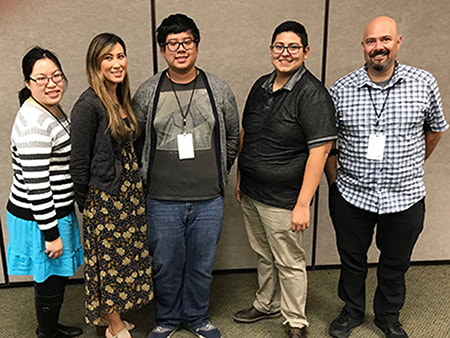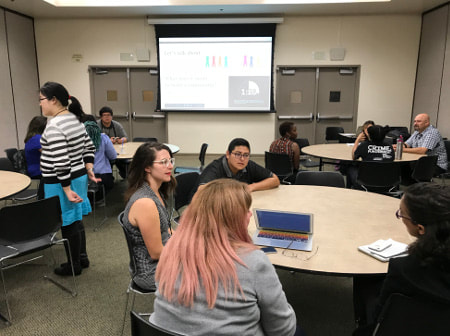|
School of Education students explained their research and engaged the audience in small group discussions during their presentation at the 2017 Digital Media and Learning Conference on Thursday, October 5 at the UCI Student Center. Their presentation title was Community Based Scholarship: Activism On and Off the Field.
Presenters: Lilly Lew, Lauren Godfrey, David Liu, Carlos Sandoval, Doron Zinger Presentation Description Education research sites have begun to use a community approach to conduct their research. Understanding these partnerships between places of learning and activism work together, we need to understand the theories of engaging in communities and research. We aim to organize educators, researchers, and teachers to discuss the methodological, epistemological, and ontological shifts of engaging in community research. Lew explained although there have been studies about the nature of deficit thinking (Valencia 1997), especially among historically marginalized communities, there are much fewer studies that explore community empowerment (Cummins 1986) and resilience models (Rios, Carias, and Bredenoord 2014). We conceptualize how digital literacy practices enable youth to explore hero narratives in an after-school program and inscribe the world. Liu talked about how one of the greatest moments of disrupting power dynamics in science education is not knowing the scientific answers. Educators believe they need the scientific content knowledge to be able to teach science. We explore the idea of educators and teachers learning about science alongside with students. Godfrey’s communicated how she wrestled with the many identities that came into play during her fieldwork in a middle school classroom and how she negotiated these identities- and differing positions of power - as she tried to balance an authentic alignment with participants' perspectives with the type of objective detachment, so often assumed to be a defining quality of "good research." Zinger discussed how in typical professional development (PD), teachers are often passive recipients of skills, knowledge, or practices that may or may not be useful for them. PD designers and instructors often do not consider the needs and backgrounds of teachers. In this talk he shared what can happen when teacher considerations become central to PD. Sandoval talked about how improvement science has emerged as an approach to educational research. Its commitments—to student- and practitioner-centeredness, networked collaboration, and iteration—are conducive to promoting equity and justice. He reflected on his identity as an “improvement person” and the contradictions he is encountering as a doctoral student at a research university. Comments are closed.
|
Resources for:
|
|



